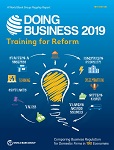Overview
In today’s globalized and highly digitalized trading environment, the ability of trade professionals to benefit from electronic systems largely depends on training and communication. In recent years, Doing Business has captured reforms that highlight the fundamental role played by education, training and communication in trade facilitation.
Customs clearance officials and customs brokers are two of the most important parties involved in a typical international trade transaction. They have different but interconnected roles with regards to education, training and communication since they are the providers and users of customs services, respectively. While the customs clearance official is an employee of the customs administration who acts as a law enforcement officer, the customs broker is a third-party, private entity who deals directly with customs officials on behalf of the exporter or importer. Given these roles, communication and training on new trade processes, as well as on IT developments, are critical.
Doing Business data show that education and training, together with communication with customs clearance officials and customs brokers, play an important role in the successful implementation of trade-related reforms. Furthermore, a well-trained and educated workforce is equipped with the knowledge to perform their day-to-day duties as well as to increase the efficiency of the overall trade process.
Main findings:
- Of the economies that implemented trade reforms as captured in Doing Business 2019, 85% regularly provide training to customs clearance officials.
- Training of customs clearance officials and customs brokers is positively associated with lower border and documentary compliance times.
- Doing Business data indicate that the average time required to clear customs (for both exports and imports) is 34% lower in economies where clearance officers receive regular training compared to those where no regular training is provided.
- Worldwide, organizing workshops is the most commonly-used channel of communication to convey changes in practice or regulations to customs officials and customs brokers.
- A majority of economies do not require a formal university degree to operate as a customs broker. However, brokers are required to obtain a license in 75% of economies measured by Doing Business.

